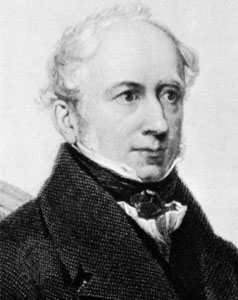 Born November 4, 1771, James Montgomery was a Scots poet and hymnist who enjoyed popularity during his time and made a mark on British literature in the early to mid-1800s. He was born at Irvine in Ayrshire, where his father was a Moravian preacher, but left there when his father was relocated to Ireland by his church. Montgomery was no more than six at the time, but his later poetry included vivid images of his hometown and his early youth.
Born November 4, 1771, James Montgomery was a Scots poet and hymnist who enjoyed popularity during his time and made a mark on British literature in the early to mid-1800s. He was born at Irvine in Ayrshire, where his father was a Moravian preacher, but left there when his father was relocated to Ireland by his church. Montgomery was no more than six at the time, but his later poetry included vivid images of his hometown and his early youth.
He was educated at the Moravian school at Fulneck from the time he was six until he was sixteen. Toward the end of his years at Fulneck, his parents were sent to the West Indies as missionaries, leaving him behind to finish his education. Though it had been hoped by his teachers and parents that the boy would become a minister, this didn’t suit him, and at 16, when he left the school, he was placed as an apprentice to a chandler. Unhappy with his first master, he ran off and took a place with a second, with whom he finished a year in service before setting off to make his own fortune.
Montgomery’s life in the world of writing began when his poetry was rejected by a publisher to whom he offered it. Instead, the man offered him a job as a clerk, where he spent eight months learning the ins and outs of the publishing business. When he returned to Yorkshire, he took a position with a bookseller who also published a newspaper in Sheffield. The bookseller, Mr. Gales, was forced to flee England when he displeased those in power, and left Montgomery the position of editor of the Sheffield Register. Montgomery promptly changed the name of the newspaper to the Sheffield Iris, and began the publication that was to land him at least twice in gaol, and support him through his middle years.
In 1795 and again in 1796, Montgomery was fined and imprisoned for ‘political offenses’ that arose from two very different circumstances. In the first case, he was commissioned to print a ballad for a ballad-monger. The poem was judged to be inflammatory, and both he and the seller were tried, fined and sentenced to time in prison. A year later, he published a piece in the Iris that was critical of the way that a riot in Sheffield was handled by a local magistrate. Again, he was tried and sentenced to time in prison. After his release, he continued to publish the Iris, which made him a comfortable living through his middle years.
Montgomery’s early attempts at verse were rejected, but in 1806 he published “The Wanderer of Switzerland” to poor reviews, though it was defended by none less than Lord Byron himself. That began a series of books and poems which attracted him notice, including “The West Indies”, “The World Before the Flood”, “The Pelican Island” and “Greenland”.
It is, however, his hymns for which Montgomery is best remembered. Says a contemporary in a short biography, “The tendency of all he wrote was to purify and elevate. The catholicity of his religious poems reflects the spirit of their author, who was singularly free from sectarian narrowness.” Those hymns are still sung “wherever the English language is spoken”.
Montgomery died in 1854 at the age of 83. The town of Sheffield accorded him the honor of a public funeral, and further honored him with a statue and a stained glass window in the Sheffield church.


Comments1
That was cool to find out about
You must register to comment. Log in or Register.